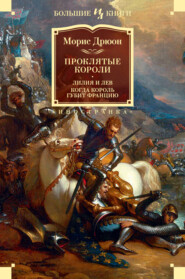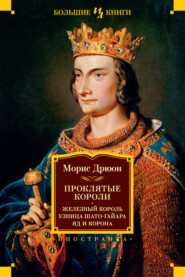По всем вопросам обращайтесь на: info@litportal.ru
(©) 2003-2025.
✖
The She-Wolf
Автор
Год написания книги
2019
Настройки чтения
Размер шрифта
Высота строк
Поля
‘Never!’ cried Charles of Valois. ‘Never will Edward join his banners to mine! Besides, can one even think of him as a Christian prince? Indeed, it’s only the Saracens who have such morals as his!’
In spite of Valois’s indignation, Mortimer felt a certain anxiety. He knew only too well what the speeches of princes were worth, and how the enemies of yesterday became reconciled tomorrow, even if only hypocritically, when it was in their interest to do so. If it occurred to Monseigneur of Valois, so as to increase the size of his crusade, to invite Edward, and if Edward pretended to accept …
‘Even if you did invite him, Monseigneur,’ Mortimer said, ‘there’s very little likelihood of King Edward responding to your invitation; he likes wrestling but hates arms, and it was not he, I can promise you, who defeated me at Shrewsbury, but Thomas of Lancaster’s bad tactics. Edward would plead, and with reason, the danger he is in from the Scots.’
‘But I want the Scots in my crusade!’ said Valois.
Robert of Artois was knocking his huge fists impatiently together. He was utterly indifferent to the crusade and, to tell the truth, had no wish to go on it. To begin with, he was always seasick. He would undertake anything on shore, but not at sea; a new-born babe would be better at it than he was. Besides, his thoughts were concerned in the first place with the recovery of his county of Artois, and to go and wander about the ends of the earth for five years was unlikely to benefit his affairs. The throne of Constantinople was no part of his inheritance, and to find himself one day governing some desert island amid forgotten seas had no attraction for him. He had no interest in the spice trade, nor any need to go and capture Saracen women; Paris was overflowing with houris at fifty sols and of bourgeoises for even less; and Madame de Beaumont, his wife, the daughter of Monseigneur of Valois, closed her eyes to all his infidelities. It was therefore in Robert’s interest to postpone the date of the crusade as long as possible and, while pretending enthusiasm for it, to do his best to delay it. He had a plan in mind, and it was not for nothing he had brought Roger Mortimer to see his father-in-law.
‘I wonder, Charles,’ he said, ‘whether it is really wise to leave the kingdom of France deprived of its men for so long and, without either its nobility or your hand at the helm, at the mercy of the King of England, who has given so much evidence of his ill-will towards us.’
‘The castles will be provisioned, Robert; and we shall leave sufficient garrisons,’ Valois replied.
‘But without the nobility and most of the knights, and without you, I repeat, who are our one great general, who will defend the kingdom in our absence? The Constable, who is nearly seventy-five and can only remain in the saddle by a miracle? Our King Charles? If Edward, as Lord Mortimer tells us, does not much care for war, our dear cousin is still less skilled in it. Indeed, if it comes to that, what can he do except show himself fresh and smiling to the people? It would be folly to leave the field open to Edward’s sly tricks without having first weakened him by a defeat.’
‘Then let’s help the Scots,’ suggested Philippe of Valois. ‘Let’s land on their coasts and support their war. For my part, I’m ready to do so.’
Robert of Artois looked down so as not to show what he was thinking. There’d be a pretty mess if brave Philippe took command of an expedition to Scotland. The heir to the Valois had already shown his capacity in Italy, where he had been sent to support the Papal Legate against the Visconti of Milan. Philippe had arrived proudly with his banners, and had then allowed himself to be so imposed on and out-manœuvred by Galeazzo Visconti that he had, in fact, yielded everything while believing himself victorious, and had come home without even having engaged in a skirmish. One needed to beware above all of any enterprise in which he was engaged. None of which prevented Philippe of Valois being Robert’s best and closest friend, as well as his brother-in-law. But, indeed, you can think what you like of your friends, provided you don’t tell them.
Roger Mortimer had paled a little on hearing Philippe of Valois’s suggestion. For if he was King Edward’s adversary and enemy, England was nevertheless still his country.
‘For the moment,’ he said, ‘the Scots are being more or less peaceful; they appear to be respecting the treaty they imposed on Edward a year ago.’
‘But, really,’ said Robert, ‘to get to Scotland you have to cross the sea. Let’s keep our ships for the crusade. But we have better grounds on which to defy that bugger Edward. He has failed to render homage for Aquitaine. If we forced him to come and defend his rights to his duchy in France, and then went and crushed him we should, in the first place, all be avenged and, in the second, he’d stay quiet enough during our absence.’
Valois was fiddling with his rings and reflecting. Once again Robert was showing himself to be a wise counsellor. Robert’s suggestion was still vague, but already Valois was visualizing its implications. Aquitaine was far from unknown territory to him; he had campaigned there – his first, great and victorious campaign – in 1294.
‘It would undoubtedly be good training for our knights, who have not been properly to war for a long time now,’ he said; ‘and also an opportunity of trying out this gunpowder artillery the Italians are beginning to make use of and which our old friend Tolomei offers to supply us with. And the King of France can certainly sequester the Duchy of Aquitaine owing to the default in rendering homage for it.’
He thought for a moment.
‘But it won’t necessarily lead to a real campaign,’ he went on. ‘As usual, there’ll be negotiations; it’ll become a matter for parliaments and embassies. And eventually the homage will be rendered with a bad grace. It’s not really a completely safe pretext.’
Robert of Artois sat down again, his elbows on his knees, his fists supporting his chin.
‘We can find a more sure pretext than a mere failure to render homage,’ he said. ‘I have no need to inform you, Cousin Mortimer, of all the difficulties, quarrels and battles to which Aquitaine has given rise since Duchess Alienor, having made her first husband, our King Louis VII, so notorious a cuckold that their marriage was dissolved, took her wanton body and her duchy to your King Henry II of England. Nor need I tell you of the treaty with which our good King Saint Louis, who did his best to put things on an equitable basis, tried to put a term to a hundred years of war.
But equity goes for nothing in settlements between kingdoms. The treaty Monseigneur Saint Louis concluded with Henry III Plantagenet, in the Year of Grace 1259, was so confused that a cat couldn’t have found her kittens in it. Even the Seneschal de Joinville, your wife’s great-uncle, Cousin Mortimer, who was devoted to the sainted King, advised him not to sign it. Indeed, we have to admit frankly that the treaty was a piece of folly.’
Robert felt like adding: ‘As was also everything else Saint Louis did, for he was undoubtedly the most disastrous king we ever had. What with his ruinous crusades, his botched treaties, and his moral laws in which what is black in one passage is discovered to be white in another … Oh, how much happier France would have been had she been spared that reign! And yet, since Saint Louis’s death, everyone regrets him, for their recollection is at fault; they remember only how he dealt out justice under an oak and, through listening to the lies of bumpkins, wasted the time he should have been devoting to the kingdom.’
He went on: ‘Since the death of Saint Louis, there has been nothing but disputes, arguments, treaties concluded and broken, homage paid with reservations, hearings by Parliament, plaintiffs non-suited or condemned, rebellions in those lands and then further prosecutions. But when you, Charles, were sent by your brother Philip the Fair into Aquitaine,’ Robert asked, turning to Valois, ‘and so effectively restored order there, what were the actual motives given for your expedition?’
‘Serious rioting in Bayonne, where French and English sailors had come to blows and shed blood.’
‘Very well!’ cried Robert. ‘We must organize an occasion for more rioting like that of Bayonne. We must take steps to see that somewhere or other the subjects of the two Kings come to serious blows and that a few people get killed. And I believe I know the very place for it.’
He pointed his huge forefinger at them and went on: ‘In the Treaty of Paris, confirmed by the peace of 1303, and reviewed by the jurists of Périgueux in the year 1311, the case of certain lordships, which are called privileged, has always been reserved, for though they lie within the borders of Aquitaine, they owe direct allegiance to the King of France. And these lordships themselves have dependencies, vassal territories, in Aquitaine, but it has never been definitely decided whether these dependencies are subject to the King of France or to the Duke of Aquitaine. You see the point?’
‘I do,’ said Monseigneur of Valois.
His son, Philippe, did not see it. He opened wide blue eyes and his failure to understand was so obvious that his father explained: ‘It’s quite simple, my boy. Suppose I gave you, as if it were a fief, the whole of this house, but reserved to myself the use and free disposal of this room in which we are now sitting. And this room has, as a dependency, the ante-room which controls this door. Which of us enjoys rights over the ante-room and is responsible for its furnishing and cleaning? The whole plan,’ Valois added, turning back to Robert, ‘depends on being able to arrange action of sufficient importance to compel Edward to make a rejoinder.’
‘There’s a very suitable dependency,’ the giant replied, ‘in the lands of Saint-Sardos, which appertain to the Priory of Sarlat in the diocese of Périgueux. Their status was argued when Philip the Fair agreed to a Treaty of Association with the Prior of Sarlat, which made the King of France co-lord of that lordship. Edward I appealed to the Parliament of Paris, but nothing was decided.
If the King of France, as co-lord of Sarlat, builds a castle in the dependency of Saint-Sardos and puts into it a strong garrison threatening the surrounding territory, what does the King of England, as Duke of Aquitaine, do about it? He must clearly give orders to his Seneschal to oppose it, and will want to station troops there himself. And the first time a couple of soldiers meet, or an officer of the King is maltreated or even insulted …’
Robert spread wide his great hands as if the result was obvious. And Monseigneur of Valois, in his blue, gold-embroidered, velvet robes, rose from his throne. He could already see himself in the saddle, at the head of his banners; he would leave for Guyenne where, thirty years ago, he had won a great victory for the King of France.
‘I congratulate you, Brother,’ cried Philippe of Valois, ‘on the fact that so distinguished a knight as you are should also have as great a knowledge of procedure as a lawyer.’
Вы ознакомились с фрагментом книги.
Приобретайте полный текст книги у нашего партнера:
Приобретайте полный текст книги у нашего партнера:

















